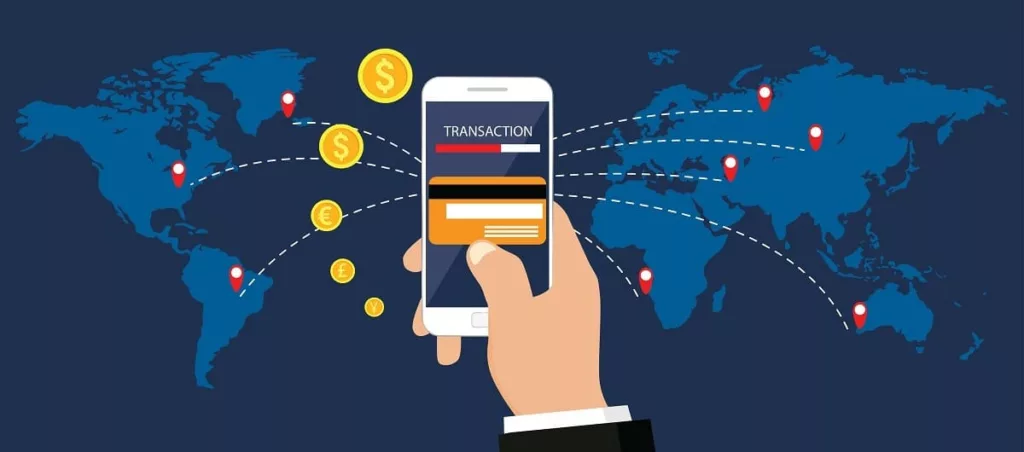Since its introduction in 2014, blockchain technology has changed the game for even non-IT businesses. In 2024, people are focusing on its ability to secure payments with blockchain, which is more important than ever. This is particularly true in the Asia-Pacific (APAC) region, which is home to some of the world’s fastest-growing economies.
Cross-border payments play a crucial role in facilitating international trade, supporting economic growth, and promoting financial inclusion. However, the traditional methods of conducting these transactions are often fraught with challenges, including high costs, slow processing times, and lack of transparency.
Enter blockchain technology. Originally developed as the underlying technology for cryptocurrencies, blockchain has the potential to revolutionize various industries, including the financial sector. This blog post will explore the possibilities of using blockchain technology to facilitate secure and efficient cross-border payments in the APAC region.
Table of Contents
Possibility 1: Increased Security

Blockchain technology is revolutionizing cross-border payments, offering a fortress of security for businesses. Confidence in this technology is soaring, as evidenced by reports from the World Economic Forum and J.P. Morgan.
The Inter-American Development Bank (IDB) conducted a successful proof of concept for cross-border payments. This project explored using secure payments with blockchain by sending tokenized money between their Washington D.C. headquarters and individuals in the Dominican Republic. The results were promising, demonstrating that blockchain can not only make cross-border payments feasible, but also faster, more traceable, and less manual, ultimately leading to significant fee reductions.
These reports highlight how blockchain fosters transparency, efficiency, and most importantly, enhanced security. Here’s how blockchain safeguards your transactions:
- Decentralization: Forget a single point of failure. Blockchain distributes transaction records across a vast network, making them incredibly difficult to tamper with. Any attempt at fraud would be readily identified by the network. IBM World Wire uses a decentralized network for transactions, making them incredibly difficult to tamper with.
- Immutable Records: Every transaction on IBM World Wire is permanently recorded and immutable. Cryptography, a form of complex encryption, ensures the tamper-proof nature of these records. Think of it as an unalterable receipt for every payment, guaranteeing the integrity of every transaction.
- Cryptography: Hackers are no match for the robust security measures in IBM World Wire. Cryptography, employing complex mathematical algorithms, acts as a virtual fortress. This impenetrable security makes it virtually impossible for hackers to steal your payment information.
- Smart Contracts: These automated contracts execute transactions exactly as they’re supposed to, reducing the risk of human error or manipulation. This means that payments will be made correctly and as agreed upon. IBM World Wire uses smart contracts to automate transactions, reducing the risk of human error or manipulation.
- Identity Verification: By ensuring that all parties in a transaction are who they say they are, the risk of identity theft is greatly reduced. This means you can be confident that you’re sending money to the right person or entity. IBM World Wire ensures that all parties in a transaction are who they say they are, greatly reducing the risk of identity theft.
Possibility 2: Reduced Costs
Blockchain technology disrupts the traditional cross-border payment system, eliminating cross-border trade challenges, significantly reducing costs, and accelerating transactions. Deloitte estimates a 40% to 80% reduction in transaction costs for businesses and individuals using blockchain, with settlements happening in just 4-6 seconds compared to days with traditional methods.
Ripple has developed a solution called On-Demand Liquidity (ODL) that uses the digital asset XRP to enable funds to be sent to destination accounts immediately. This solution not only reduces the transaction time but also frees up working capital,
- Elimination of Intermediaries: Sending a package overseas can be a bureaucratic nightmare with intermediaries and fees at every stop. RippleNet, powered by blockchain, disrupts this model. It facilitates direct transactions between parties, eliminating the middleman and their associated costs. Think of it as a direct line for your goods and funds, streamlining the entire trade process.
- Lower Transaction Fees: Traditional financial systems often incur hefty fees, especially for international transfers. Blockchain technology offers a solution. RippleNet operates on a vast, distributed digital ledger, significantly reducing operational costs. Unlike traditional ledgers requiring expensive upkeep, this network is maintained by a network of computers, minimizing overhead. This reduction in costs translates into more affordable transactions for you.
- Efficient Currency Exchange: Exchanging currencies can be a time-consuming and expensive ordeal for your customers. But what if there was a universal currency accepted everywhere? RippleNet, with its native token XRP, acts as a bridge between different currencies. It ensures payments are settled in the recipient’s local currency within seconds, streamlining the entire exchange process and minimizing conversion fees.
- Reduced Operational Costs: Manual paperwork slows down trade processes and increases operational costs. RippleNet leverages smart contracts, self-executing agreements that automate tasks when pre-defined conditions are met. Imagine a tireless robot handling all the paperwork – that’s the power of smart contracts. They eliminate manual work, paperwork, and reconciliation efforts, leading to significant cost savings.
- Lower Compliance Costs: Compliance with regulations is crucial but often complicated and expensive. Blockchain, with its transparent and unchangeable records, simplifies this process. It’s like having a clear, tamper-proof record of all transactions, making audit and regulatory compliance easier and potentially cheaper.
Possibility 3: Faster Transactions

Sending money internationally used to take days! Not anymore, with blockchain technology, money now travels in seconds, not days. That’s the dramatic speed improvement offered by blockchain technology for cross-border payments. Traditional transfers can take 2-3 days, but blockchain finalizes transactions in just 4-6 seconds.
TradeLens, a blockchain-powered platform, disrupts traditional methods by facilitating direct transactions between buyers and sellers. Gone are the days of intermediaries slowing down the process – TradeLens connects parties directly, just like a shipment bypassing multiple ports.
- Direct Transactions: Normally, sending any package overseas would pass through several post offices before reaching its destination. But what if you could send the package directly? That’s what blockchain does. It allows transactions to happen directly between parties, cutting out the middlemen and speeding up the process. TradeLens allows transactions to happen directly between parties, cutting out the middlemen and speeding up the process.
- 24/7 Availability: Traditional banking systems have opening hours. But what if the bank was open all the time? Blockchain operates 24/7, meaning transactions can be processed at any time. So, no matter when you want to send or receive money, blockchain is always ready. TradeLens operates 24/7, meaning transactions can be processed at any time.
- Automated Processes: Imagine having a robot that automatically does all the paperwork for your transactions. That’s what blockchain’s smart contracts do. They automatically carry out transactions when certain conditions are met, speeding up the process. TradeLens’s smart contracts automate processes, reducing the need for manual work, paperwork, and efforts to reconcile records.
- Batch Processing: Sometimes, you need to make multiple payments at once. Blockchain can handle multiple transactions simultaneously, just like a multi-lane highway allows many cars to travel at the same time. This can be particularly beneficial for businesses making multiple cross-border payments at once. TradeLens can handle multiple transactions simultaneously.
- Real-Time Tracking: With blockchain, you can track your transaction in real-time, just like tracking a package online. This can speed up the resolution of any issues and reduce the time taken for funds to reach their destination. The transparent and unchangeable records of blockchain simplify the process of audit and regulatory compliance.
Possibility 4: Greater Transparency
Blockchain technology can significantly increase transparency in cross-border payments. According to the World Economic Forum, confidence in blockchain technologies is rising as more governments and businesses invest in these areas. Blockchain technologies are connecting global financial systems so they are easily interoperable, efficient, affordable, and accessible. This can reduce the cost and time of cross-border payments.
Everledger uses blockchain technology to create a secure and permanent digital record of an asset’s origin, characteristics, and ownership. This information is then made available to all stakeholders in the value chain, including insurers, law enforcement agencies, and consumers. Here’s how:
- Immutable Records: Everledger creates immutable records for every asset, providing a clear and trustworthy record. smart shoppers know that every transaction you make needs a receipt, and once it’s printed, it can’t be changed or thrown away. That’s what blockchain does with its immutable records. Every transaction is recorded and stays there forever, providing a clear and trustworthy record.
- Real-Time Tracking: Everledger allows stakeholders to track the progress of an asset in real-time, making the process transparent and reducing the likelihood of disputes. It’s like tracking a parcel online. You can see where it is at any moment until it reaches its destination. Similarly, blockchain allows everyone involved in a transaction to track its progress in real-time, making the process transparent and reducing the likelihood of disputes.
- Public Ledger: Everledger operates as a public ledger where all transactions are posted for everyone to see. Think of blockchain as a big noticeboard where all transactions are posted for everyone to see. This public nature of blockchain enhances transparency as all participants in the network can see the transaction data.
- Auditability: The clear and unchangeable record of transactions makes auditing a breeze. It’s like having a clear trail of breadcrumbs leading back to the start of each transaction. This can be particularly beneficial for regulatory compliance and dispute resolution.
- Smart Contracts: Imagine having a contract that automatically executes itself once the agreed terms are met. That’s what smart contracts do. And because they’re on the blockchain, everyone can verify that the terms have been met, increasing transparency. Everledger uses smart contracts to automate processes, reducing the need for manual work, paperwork, and efforts to reconcile records1.
Possibility 5: Facilitating Financial Inclusion

Blockchain technology is poised to revolutionize financial inclusion, especially for APAC businesses engaged in cross-border trade. According to PwC, it has the potential to bring essential financial services to a staggering 1.4 billion people currently lacking access to bank accounts.
M-Pesa has leveraged blockchain technology to expand access to financial services, particularly in remote areas of Kenya. This platform allows users to deposit money into an account stored on their mobile phones, to send balances using PIN-secured SMS text messages to other users, including sellers of goods and services, and to redeem deposits for regular money.
Here’s how…
- Access to Financial Services: Limited access to traditional banking hinders international trade for many APAC businesses. M-Pesa steps in, offering a digital payment platform powered by blockchain. Think of it as a digital wallet accessible to all, regardless of bank accounts. Now, small businesses can participate in international trade with ease.
- Lower Entry Barriers: Starting international trade can be daunting due to complex regulations and intermediaries. But what if you could trade directly with your partners, eliminating the need for middlemen? M-Pesa’s blockchain technology provides a transparent and verifiable record of transactions, simplifying the process. It’s like having a direct line to your trading partner, streamlining international trade.
- Trust and Transparency: M-Pesa’s blockchain platform provides a transparent and unchangeable record of all transactions, building trust among businesses, their partners, and customers. With blockchain, every transaction is recorded and can’t be changed. This transparency builds trust among businesses, their partners, and customers. It’s like having a clear, tamper-proof record of all transactions.
- Microtransactions: Sometimes, small transactions can be costly with traditional banking systems. But with blockchain, these microtransactions become feasible. It’s like being able to send small amounts of money overseas without incurring high fees.
- Financial Empowerment: Financial independence is crucial for any business. M-Pesa empowers you by putting you in control of your transaction records. Manage your finances and conduct transactions on your own terms, just like handling your personal finances independently. Blockchain technology within M-Pesa grants businesses greater autonomy in managing their financial activities.
Conclusion:
Since its arrival a decade ago, blockchain technology has proven to be more than a passing fad, due to its applications and benefits to businesses worldwide. Its potential to enhance security, slash costs, expedite transactions, boost transparency, and empower financial inclusion is undeniable. Businesses and financial institutions worldwide are already capitalizing on these benefits, redefining the way we approach and manage international payments.
At Vinova, the transformative power of blockchain technology is at the forefront of our expertise. Our team of experts possesses deep knowledge of blockchain applications across diverse industries. And our gurus can dispense the same knowledge for you as well.
Curious how blockchain can revolutionize your business? We’re here to help! Contact Vinova and embark on your journey towards secure, efficient, and transparent cross-border payments with blockchain. Our knowledge can be yours too, today!